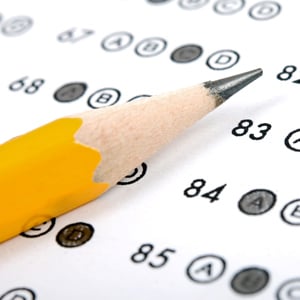LSAC says it won't continue certifying LSAT scores for the ABA

Updated: The Law School Admission Council, which certifies LSAT scores and undergraduate GPA data submitted by law schools for ABA accreditation, announced Aug. 2 that it intends to suspend the service. The organization’s letter cites consideration by the council of the ABA Section of Legal Education and Admissions to the Bar to allow use of the GRE exam instead of the LSAT for law school admission.
The ABA is reviewing a study that found GRE results also accurately predict first-year law students’ grades. It was commissioned by the University of Arizona School of Law, which in February was the first law school to open admissions to GRE test-takers.The Educational Testing Service, which administers the GRE, conducted the study.
“Our board believes that certifying LSAT scores when other scores are not certified could lead to more confusion for applicants and for law schools,” Susan L. Krinsky, chair of the LSAC’s board of trustees, told the ABA Journal. Krinsky, an associate dean at the University of Maryland Francis King Carey School of Law, added that the board thinks LSAT scores should not be held to a different certification standard than other test scores.
David G. Payne, vice president and chief operating officer of Educational Testing Service, says that in July his organization met with the LSAC and offered to develop an option where law school candidates could send their GRE scores to the LSAC so the scores would be included in its credential assembly services. ETS also offered to provide the LSAC with GRE score summaries sent to law schools.
But Daniel Bernstine, LSAC president, doesn’t seem to have confidence in the offer. “ETS’ proposal does not address LSAC’s concerns about how all test scores will be reported by law schools and treated by the ABA and ultimately U.S. News. We are working with our member law schools to ascertain how best to meet their needs regarding admission credentials,” he told the ABA Journal in a statement. In the Aug. 2 letter, the LSAC noted that LSAT scores weigh heavily in law school rankings published by U.S. News and World Report.
The LSAC letter (PDF), posted on an American Lawyer Media website, notes that after the council clarifies reporting requirements for all admission-test scores, the LSAC would consider resuming participation with its “matriculant certification service, if we can be assured that the certification service would provide an accurate and complete profile of law school marticulants.”
Barry Currier, the ABA’s managing director of accreditation and legal education, hopes that certification process will be continued. His impression from the letter is that the LSAC declared its intent to suspend the project, subject to considering suggestions from member schools.
“We look forward to seeing what that input offers, and to the LSAC continuing to explore ways that the certification process might be continued, at least for the present and while alternative approaches to credential data are considered,” he said.
The ABA asked the LSAC for help in 2011 in response to concerns about the accuracy of admissions data reported by law schools. One year later, the ABA censured and fined the University of Illinois College of Law $250,000 for intentionally publishing false LSAT and GPA admissions scores.
“My concern is how are schools going to respond if the LSAC is no longer policing them,” said Alfred Brophy, a professor at the University of North Carolina School of Law. “Some schools are honest and will turn in accurate data, but will others may say: ‘There’s no sheriff looking over our shoulder, let’s shade the truth.’” Brophy has written various articles about law school rankings and employment.
Law schools already receive variances from the ABA that allow them to admit some students who don’t take the LSAT, Brophy says. “I don’t think of that as a way to hide poor LSAT scores, I see it as a way to scoop a few more students who couldn’t motivate themselves to take the LSAT,” Brophy said. He has taken the LSAT and the GRE himself, and he found the LSAT harder, but his percentiles from both tests were almost identical.
The LSAT was designed specifically for use by law schools, while the GRE is a more general-use exam. So the former might be a better predictor of law school performance than the GRE, says Michael Simkovic, a law professor at Seton Hall whose academic works focuses on the intersection of law and finance. Simkovic has received a grant from the LSAC for research, including studying the impact of graduating in a recession or a booming economy.
“It sounds like LSAC is concerned that some law schools might encourage students to take a test like the GRE instead of the LSAT if the school believes the students would not score as highly on the LSAT and the schools are concerned about their rankings,” he says. “I think over the long run, the problem could probably be solved by using score equivalences. Scores on many standardized tests correlate reasonably well.”
Updated Aug. 11 to include subsequent coverage.



